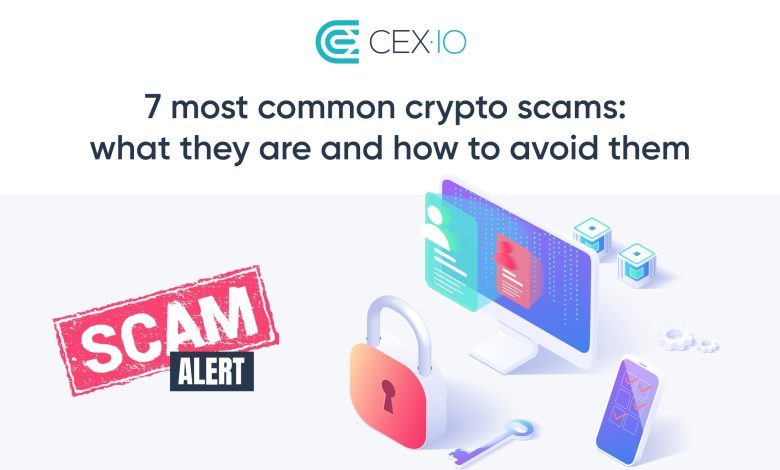Common Crypto Scams and How to Avoid Them

- Understanding common crypto scams
- Tips to protect yourself from crypto fraud
- Recognizing red flags in crypto investments
- Avoiding phishing scams in the crypto world
- Protecting your assets from Ponzi schemes
- Educating yourself on crypto security measures
Understanding common crypto scams
When it comes to common crypto scams, it’s essential to be aware of the various tactics scammers use to deceive unsuspecting individuals. One prevalent scam is phishing, where scammers send emails or messages pretending to be from legitimate crypto exchanges or wallets, asking for personal information. Another common scam is ponzi schemes, where scammers promise high returns on investments but ultimately use new investors’ money to pay off existing investors.
It’s crucial to be cautious of fake ICOs, where scammers create fake initial coin offerings to lure investors into investing in non-existent projects. Additionally, fake wallets and exchanges are another prevalent scam, where scammers create fake platforms to steal users’ funds. Lastly, cryptojacking is a scam where scammers infect computers with malware to mine cryptocurrencies without the user’s knowledge.
To avoid falling victim to these common crypto scams, it’s essential to conduct thorough research before investing in any project or platform. Be wary of unsolicited messages asking for personal information or promising high returns. Always use reputable wallets and exchanges, and keep your devices protected with up-to-date security software. By staying informed and vigilant, you can protect yourself from falling prey to these scams.
Tips to protect yourself from crypto fraud
Protecting yourself from crypto fraud is crucial in the digital age. Here are some tips to help you avoid falling victim to common crypto scams:
- Do thorough research before investing in any cryptocurrency to ensure it is legitimate.
- Avoid sharing your private keys or wallet information with anyone.
- Be cautious of unsolicited emails or messages asking for personal information or financial details.
- Use secure wallets and exchanges to store and trade your crypto assets.
- Enable two-factor authentication on all your crypto accounts for an extra layer of security.
- Stay informed about the latest crypto scams and fraudulent activities to protect yourself.
By following these precautionary measures, you can safeguard your crypto investments and assets from fraudulent schemes.
Recognizing red flags in crypto investments
When considering crypto investments, it is crucial to be aware of red flags that may indicate a potential scam. By recognizing these warning signs, investors can protect themselves from falling victim to fraudulent schemes. Here are some common red flags to watch out for:
- Guaranteed high returns: Be cautious of investment opportunities that promise unrealistically high profits with little to no risk. Scammers often lure in victims with the promise of quick and easy money.
- Unsolicited offers: If you receive unsolicited investment offers through email, social media, or phone calls, proceed with caution. Legitimate investment opportunities are rarely presented in this manner.
- Pressure to act quickly: Scammers often use high-pressure tactics to push investors into making rushed decisions. Take your time to research and evaluate any investment opportunity thoroughly.
- Lack of transparency: Avoid investments that lack clear information about the company, its team, and the project itself. Transparency is key to building trust with investors.
- Complexity and confusion: If the investment opportunity seems overly complex or difficult to understand, it may be a scam. Stick to investments that you can easily comprehend.
By staying vigilant and being aware of these red flags, investors can avoid falling prey to crypto scams. Remember to always conduct thorough research and seek advice from trusted sources before making any investment decisions in the crypto space.
Avoiding phishing scams in the crypto world
When it comes to navigating the world of cryptocurrency, one of the biggest threats that investors face is phishing scams. These scams are designed to trick individuals into revealing their sensitive information, such as passwords or private keys, which can then be used to steal their funds. To protect yourself from falling victim to these scams, it is important to be vigilant and follow some key steps.
- Be cautious of unsolicited emails or messages asking for your personal information. Legitimate companies will never ask you to provide sensitive information via email.
- Double-check the URL of any website you are visiting to ensure that it is legitimate. Phishing websites often have URLs that are similar to those of reputable sites, but with slight variations.
- Avoid clicking on links or downloading attachments from unknown sources. These could contain malware that compromises your security.
- Use two-factor authentication whenever possible to add an extra layer of security to your accounts.
- Keep your software up to date to protect against known vulnerabilities that scammers may exploit.
By following these precautions, you can significantly reduce your risk of falling victim to phishing scams in the crypto world. Remember, it is always better to err on the side of caution when it comes to protecting your investments and personal information.
Protecting your assets from Ponzi schemes
Protecting your assets from Ponzi schemes is crucial in the world of cryptocurrency. Ponzi schemes are fraudulent investment schemes that promise high returns with little to no risk. They rely on new investors’ money to pay returns to earlier investors, creating a cycle that eventually collapses when there are not enough new investors to sustain it.
To avoid falling victim to a Ponzi scheme, it is essential to conduct thorough research before investing in any opportunity. Be wary of investment opportunities that promise guaranteed returns or seem too good to be true. Remember the old adage, “If it sounds too good to be true, it probably is.”
Another way to protect yourself from Ponzi schemes is to diversify your investments. By spreading your assets across different investment opportunities, you can reduce the risk of losing everything to a single fraudulent scheme. Additionally, consider working with a reputable financial advisor who can help you navigate the complex world of cryptocurrency investments.
Educating yourself on crypto security measures
When it comes to protecting your crypto assets, educating yourself on security measures is crucial. By taking the time to learn about common scams and how to avoid them, you can significantly reduce the risk of falling victim to fraudulent activities.
One of the first steps in securing your crypto investments is to use a hardware wallet. These physical devices store your private keys offline, making them much less vulnerable to hacking attempts. By keeping your keys offline, you can protect your assets from online threats.
Another important security measure is to enable two-factor authentication (2FA) on all of your crypto accounts. This adds an extra layer of protection by requiring a second form of verification before allowing access to your account. By using 2FA, you can prevent unauthorized access to your funds.
It’s also essential to be cautious of phishing scams, where attackers try to trick you into revealing your private keys or login information. Always double-check the URLs of websites and emails before entering any sensitive information. If something seems suspicious, it’s best to err on the side of caution.
By staying informed and implementing these security measures, you can protect your crypto assets from common scams and fraudsters. Remember, the more proactive you are in safeguarding your investments, the less likely you are to become a victim of malicious activities in the crypto space.




